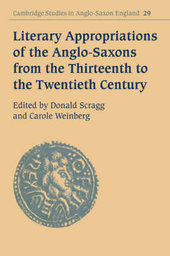
|
Literary Appropriations of the Anglo-Saxons from the Thirteenth to the Twentieth Century
Paperback / softback
Main Details
| Title |
Literary Appropriations of the Anglo-Saxons from the Thirteenth to the Twentieth Century
|
| Authors and Contributors |
Edited by Donald Scragg
|
|
Edited by Carole Weinberg
|
| Series | Cambridge Studies in Anglo-Saxon England |
|---|
| Physical Properties |
| Format:Paperback / softback | | Pages:256 | | Dimensions(mm): Height 228,Width 152 |
|
| Category/Genre | Literary studies - classical, early and medieval |
|---|
| ISBN/Barcode |
9780521031172
|
| Classifications | Dewey:820.9358 |
|---|
| Audience | | Professional & Vocational | |
|---|
| Illustrations |
1 Halftones, unspecified
|
|
Publishing Details |
| Publisher |
Cambridge University Press
|
| Imprint |
Cambridge University Press
|
| Publication Date |
2 November 2006 |
| Publication Country |
United Kingdom
|
Description
This book, first published in 2000, discusses the attitudes towards Anglo-Saxons expressed by English poets, playwrights and novelists from the thirteenth century to the present day. The essays are arranged chronologically, tracing literary responses to the Anglo-Saxons in the medieval period, the Renaissance and also the eighteenth and nineteenth centuries. In earlier centuries the Ango-Saxons were often idealized representatives of happier times. Later, they became the epitome of a 'British' race, while an individual Anglo-Saxon, King Alfred, was inflated into a national hero. A final essay suggests the disappearance of any clear sense of the cultural roots of the English in the twentieth century. The contributors, who are specialists in their respective fields from Britain and the United States, draw on works that have frequently been ignored or overlooked. They address topical issues such as nationalism, cultural identity, myth, gender and contextualization.
Reviews"This book provides us with a much fuller and more colorful sense of people's changing views of Anglo-Saxondom over the centuries." Speculum "The volume includes convenient indexes and is carefully documented throughout...consistently high editorial quality...Anglo-Saxonists and others can profiably open this collection at any points of particular interest, or they can read it straight through for a well-guided topical excursion through eight centuries of English literature." Carl T. Berkhout, Journal of English and Germanic Philology
|